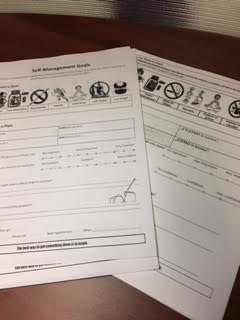Breaking Habits

When I was in high school, my mother would always tell me that'building a habit is much easier than breaking one". The context of this statement usually involved me getting into some sort of trouble. Acting out, in my mother's mind - just growing up, in mine. And so I came to loathe hearing this sentence. Now, much later, with much growing up between those years, I find that my mother'svoice pops back into my mind as I speak to patients in the waiting room at the Fantus Clinic.
Building a habit.
I find myself asking the question why people seem to be so inclined to doing so. And asking how much time needs to pass before something that was once a choice turns into something compulsory, and who should be able to judge the nature of our actions, and how to maintain and promote a level of self-awareness that does not cross over into self-criticism. One thing I do not ask myself is whether or not the second part of what my mother says is true.
They're much easier to build than to break.
There is no doubt in my mind of the truth behind this statement. I'm saying this both as a person who has had to evaluate her own behaviors to identify unhealthy habits, and as a service member who deals on a daily basis with patients engaging in the same sort of internal dialogue. I work with adult to senior-aged patients at an outpatient general medicine clinic as a health navigator, where I discuss the importance of setting self-management goals.
Eat better. Stop smoking. Lower stress. Lose weight.
In my conversations with patients, I hear a wide diversity of responses, ranging in interest and motivation and self-confidence - the only thing that seems universal to all is the fact that the most difficult part of following up with a self-management goal is overcoming pre-existing habits. The conciseness of these two-word goals belie the reality that everything is far easier said than done.
When I speak about self-management goals, I try to remain mindful of the fact that behavior change should be acknowledged as the difficult task that it is. I remind patients that, contrary to what the worksheet might suggest, we aren't looking for anyone to set such lofty goals - what we're looking for is to use those as guiding beliefs. I work together with patients to set smaller, more manageable changes that act more as building blocks towards a healthy lifestyle.
I remember my mother's words and I remember my own attempts at behavior change when I speak with patients. I do so in an attempt to keep the patients' humanity at the center of my service, and also because focusing on the patient is the best way to identify those small changes important and relevant for him or her. Eat better becomes don't add sugar to my morning coffee, add some spinach into my turkey sandwich. I hope that I provide a new voice for patients interested in changing their habits but unsure how to start. I hope that I spread along my mother's message in updated form: building a habit is much easier than breaking one, but a habit is nothing more than the sum of its parts - all of which can be identified and managed.

This post was written by CHC member Anne Lin
Anne serves as a Health Navigator at Smart Chicago Collaborative